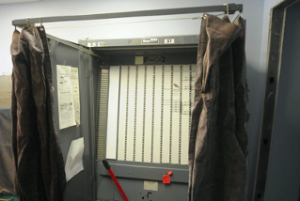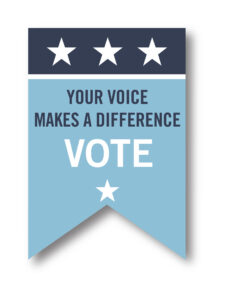To vote or not to vote ? . . . there can be no question. . .
September 15th, 2020
 I remember going to vote with my mom. That was a long time ago when voting involved going into a booth, using a big red lever to pull a curtain behind you, and using small levers to choose your candidate in private. When you finished, you pulled the big red lever, the votes were tallied, the curtain opened, and you had voted! I have a distinct memory of all this because I could sense that voting was important, and that was why my mom took me with her to vote. I suspect these early experiences have had a profound impact on me and why I always feel that I must vote . . . no matter how “big” or “small” the election. And when I could have voted by mail, I usually still chose to vote in person. There was something special about being part of the individual yet communal process. It was energizing and real . . .
I remember going to vote with my mom. That was a long time ago when voting involved going into a booth, using a big red lever to pull a curtain behind you, and using small levers to choose your candidate in private. When you finished, you pulled the big red lever, the votes were tallied, the curtain opened, and you had voted! I have a distinct memory of all this because I could sense that voting was important, and that was why my mom took me with her to vote. I suspect these early experiences have had a profound impact on me and why I always feel that I must vote . . . no matter how “big” or “small” the election. And when I could have voted by mail, I usually still chose to vote in person. There was something special about being part of the individual yet communal process. It was energizing and real . . .
 Well, the times have changed – as have the physical voting processes – and this year I applied to vote by mail. Yet my feelings about voting have not changed. It is a serious, individual, yet collective exercise of a right we have as citizens. It is how our voice gets heard in matters impacting our local and national communities.
Well, the times have changed – as have the physical voting processes – and this year I applied to vote by mail. Yet my feelings about voting have not changed. It is a serious, individual, yet collective exercise of a right we have as citizens. It is how our voice gets heard in matters impacting our local and national communities.
As a lawyer, every day I see the effects of your vote, my vote, and the votes of all who participate in this important democratic process. On the national and state-wide level, voting impacts the laws that protect our clients from discrimination, retaliation, and injuries from corporate and individual misconduct; the judges who decide how the law will apply to a client’s case; the people in the executive branch who shape government priorities and regulations; and the legislators who act as our voice between elections. Voting impacts things far beyond my day-to-day life – it affects not just what you can expect from me as an attorney but from the systems designed to protect you and your rights.
Halunen Law is dedicated to protecting your rights, and our attorneys and staff are deeply committed to exercising their voting rights. We hope you’ll join us in that conviction and take to heart the significant and wide-ranging impact your vote can have. To that end, we will be posting messages and information about voting, hoping to make the process as easy and as certain as possible. No doubt, you have seen multiple sources saying “Make a Plan” as you think about voting. That is good advice. And that is the theme our posts will build on. Your voice makes a difference. We hope you’ll agree.
Below are some helpful tips and resources.
Make a plan. And then have a back-up plan for your plan. This is a critically important election and your participation is imperative. In this challenging time of Covid-19 it’s essential that you have a plan on how, when, and where you’re going to vote. And, have a back-up plan in case your well-laid plans change. Here are some helpful resources for Minnesota residents from the ACLU Minnesota and a nationwide guide from NBC News to help you, your friends and family prepare.
Understanding Minnesota’s Vote by Mail Option: The Minnesota Secretary of State’s website offers a host of helpful information and answers to common questions about voting by mail. Here you’ll find out how to request a mail-in ballot, deadlines for application and returning your ballot, how to contact your local election office, and even how to track your ballot once you’ve mailed it back. A helpful resource to keep on hand!
Mark your calendars for these important dates:
- Election Day is Tuesday, November 3, 2020
- The deadline to register online to vote is Tuesday, October 13, 2020
- The deadline for registering by mail to vote is (received by) Tuesday, October 13, 2020
- The deadline to register in person to vote is Tuesday, November 3, 2020
- The deadline to request a ballot by mail is (received by) Monday, November 2, 2020
- The early voting period runs from Friday, September 18, 2020 to Monday, November 2, 2020, but dates and hours may vary based on where you live.
- You can also register and vote on Election Day
Get more information at the Minnesota Secretary of State website.
Voting Rights and Civil Rights: United in the fight. “At our nation’s founding, voting was enshrined only for educated white men who owned property. It took more than a century for the franchise to meaningfully expand to people of color, women, people with disabilities, people who are low-income, and Native Americans. Today, some elected leaders are still working to silence people who were historically denied access to the ballot box. Voting, and the ability to participate in democracy, is a racial justice issue. It is a civil rights issue. And we are overdue for a change.” The Leadership Conference on Civil & Human Rights is working to ensure your voting rights. Learn more about their ongoing work to help you exercise your right to be heard.
“The vote is the most powerful, non-violent tool we have in a democratic society.” – John Lewis. Watch this powerful video to learn more about the late John Lewis and his remarkable legacy in fighting for voting rights across our country.
From local laws to national legislation — your vote has impact . As attorneys we see the power of vote at work every day. On the national and state-wide level, voting impacts the laws that protect our clients from discrimination, retaliation, and injuries from corporate and individual misconduct; the judges who decide how the law will apply to a client’s case; the people in the executive branch who shape government priorities and regulations; and the legislators who act as our voice between elections.
Track your vote! Learn how Minnesota voters can track the status of their mail-in or absentee ballot
 A Partner at Halunen Law, Susan Coler represents whistleblowers across the United States in many different industries who challenge illegal corporate conduct, including fraud against the government. Motivated by the power of whistleblowers to achieve systemic change—and outraged at the mistreatment of those who blow the whistle on corporate wrongdoing—Susan is driven to confront illegal corporate conduct and pursue justice on behalf of her courageous clients.
A Partner at Halunen Law, Susan Coler represents whistleblowers across the United States in many different industries who challenge illegal corporate conduct, including fraud against the government. Motivated by the power of whistleblowers to achieve systemic change—and outraged at the mistreatment of those who blow the whistle on corporate wrongdoing—Susan is driven to confront illegal corporate conduct and pursue justice on behalf of her courageous clients.
Your Voice Makes a Difference:
Poll watchers? Guns? Freedom of speech? Understand election day laws.
Federal statutes make it a crime to intimidate voters. Read the “Fact Sheet: Protecting Against Voter Intimidation,” for a helpful, comprehensive overview of federal rules protecting voters’ rights.
Don’t be intimidated by unlawful actions.
The Minnesota Constitution forbids private military units from operating outside state authority, providing that “[t]he military shall be subordinate to the civil power.” Know what to do if you see trouble at your polling place.
You have a right to take time off to vote.
You have a right to take time off work to vote without losing your pay, personal leave, or vacation time. Your employer can’t directly or indirectly refuse, limit, or interfere with this right. Get the facts on your voting rights.
Know your rights when you vote in-person on November 3rd.
Understanding your voting rights is essential. For those who vote in person on Nov. 3rd the MN Secretary of State Office offers a comprehensive overview of your protected rights. Knowledge is power. Read up!
Voting rights for people with disabilities.
Federal and state laws require that all polling places be accessible and usable by elderly voters or voters with disabilities. The Minnesota Council on Disability provides useful resources and information to help you plan your vote.
Your voting rights explained.
The ACLU Minnesota offers “Important Election Day Guidelines to Remember” that every voter should read before heading to the polls. Get informed and Get Out The Vote!

